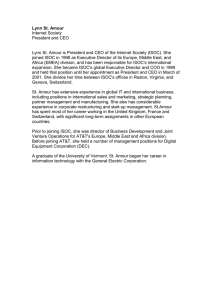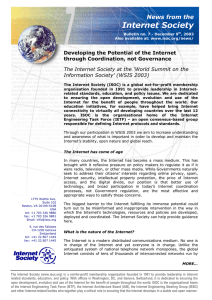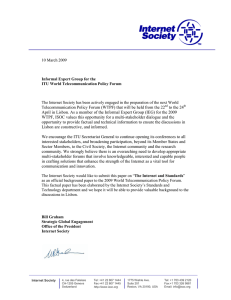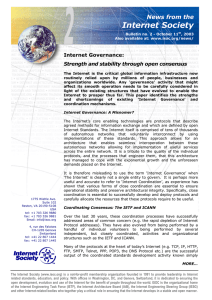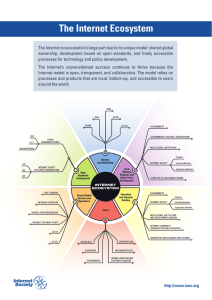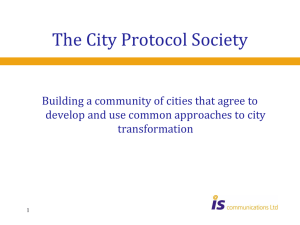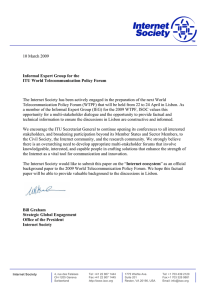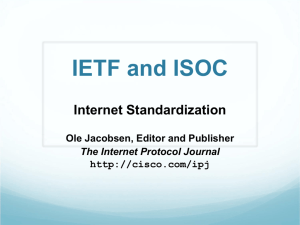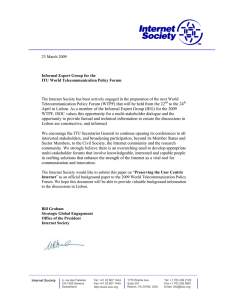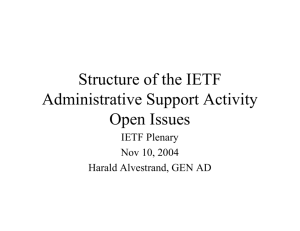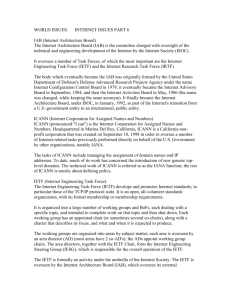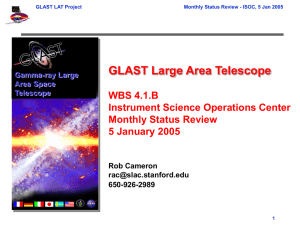Internet Society News from the The Genius of the Internet:
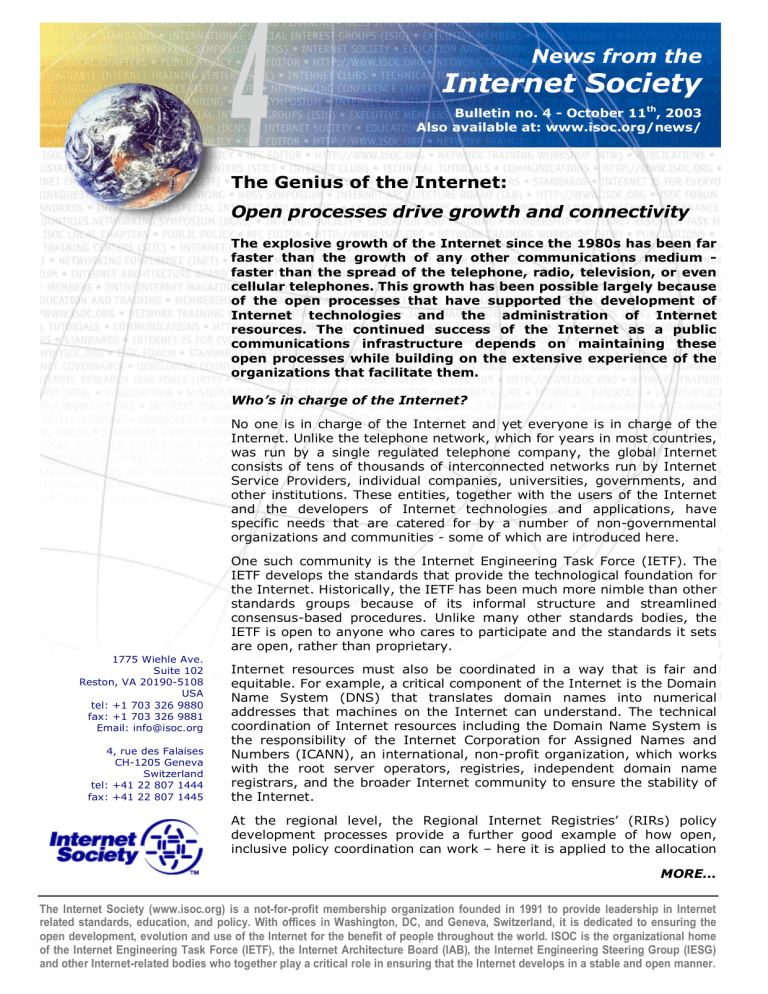
4
The Genius of the Internet:
News from the
Internet Society
Bulletin no. 4 - October 11 th , 2003
Also available at: www.isoc.org/news/
Open processes drive growth and connectivity
The explosive growth of the Internet since the 1980s has been far faster than the growth of any other communications medium faster than the spread of the telephone, radio, television, or even cellular telephones. This growth has been possible largely because of the open processes that have supported the development of
Internet technologies and the administration of Internet resources. The continued success of the Internet as a public communications infrastructure depends on maintaining these open processes while building on the extensive experience of the organizations that facilitate them.
1775 Wiehle Ave.
Suite 102
Reston, VA 20190-5108
USA tel: +1 703 326 9880 fax: +1 703 326 9881
Email: info@isoc.org
4, rue des Falaises
CH-1205 Geneva
Switzerland tel: +41 22 807 1444 fax: +41 22 807 1445
Who’s in charge of the Internet?
No one is in charge of the Internet and yet everyone is in charge of the
Internet. Unlike the telephone network, which for years in most countries, was run by a single regulated telephone company, the global Internet consists of tens of thousands of interconnected networks run by Internet
Service Providers, individual companies, universities, governments, and other institutions. These entities, together with the users of the Internet and the developers of Internet technologies and applications, have specific needs that are catered for by a number of non-governmental organizations and communities - some of which are introduced here.
One such community is the Internet Engineering Task Force (IETF). The
IETF develops the standards that provide the technological foundation for the Internet. Historically, the IETF has been much more nimble than other standards groups because of its informal structure and streamlined consensus-based procedures. Unlike many other standards bodies, the
IETF is open to anyone who cares to participate and the standards it sets are open, rather than proprietary.
Internet resources must also be coordinated in a way that is fair and equitable. For example, a critical component of the Internet is the Domain
Name System (DNS) that translates domain names into numerical addresses that machines on the Internet can understand. The technical coordination of Internet resources including the Domain Name System is the responsibility of the Internet Corporation for Assigned Names and
Numbers (ICANN), an international, non-profit organization, which works with the root server operators, registries, independent domain name registrars, and the broader Internet community to ensure the stability of the Internet.
At the regional level, the Regional Internet Registries’ (RIRs) policy development processes provide a further good example of how open, inclusive policy coordination can work – here it is applied to the allocation
MORE…
The Internet Society (www.isoc.org) is a not-for-profit membership organization founded in 1991 to provide leadership in Internet related standards, education, and policy. With offices in Washington, DC, and Geneva, Switzerland, it is dedicated to ensuring the open development, evolution and use of the Internet for the benefit of people throughout the world. ISOC is the organizational home of the Internet Engineering Task Force (IETF), the Internet Architecture Board (IAB), the Internet Engineering Steering Group (IESG) and other Internet-related bodies who together play a critical role in ensuring that the Internet develops in a stable and open manner.
Page 2 of 2
Bulletin no. 4 - October 11 th , 2003. www.isoc.org/news/ and assigning of Internet Protocol (IP) resources within a particular geography.
All these organizations and groups share several common characteristics: they are open, independent, non-profit membership organizations that work together to meet the needs of the global Internet community. They provide for direct participation by any interested party and ensure that the policies for allocating Internet resources (such as domain names and
IP addresses) are defined by those who require them for their operations.
This self-regulation has been the key to the successful growth of the
Internet and is flexible enough to adapt to changing future needs.
The Internet has evolved in a way that ensures that no one person or entity is “in charge”. No one person or entity can determine how the
Internet will work and what applications can or cannot run on the
Internet. And that is the genius and beauty of the Internet. Hundreds of different organizations and thousands of different companies make decisions every month that might affect how the Internet develops.
Through this decentralized process, the companies that supply connectivity, services, computers, software, and content - along with the users who purchase them and employ the network for their own purposes
- are free to innovate, experiment, generate value, and enjoy the connectivity, information, and services that are made available. More than any other communications medium, it is the users that define what the
Internet is and what it will become.
What can the Internet community do to help ensure the continued rapid growth and evolution of the Internet?
At a time when many of the existing processes behind the development and administration of the Internet are being questioned, it is more important than ever before that policy makers – both in the public and private sectors – have a sound understanding of just how the Internet has developed and what has made this development so successful. The biggest future threat to the stability, growth and global reach of the
Internet may come from decisions based on uninformed discussions or a lack of understanding of the unique way in which the Internet’s technologies and resources are developed and coordinated.
The Internet Society (ISOC) actively encourages the further development of the open processes that have enabled the Internet’s growth. We will respect the outcomes of these processes and we will advocate for their recognition and respect by other interested parties.
Furthermore, the Internet Society will continue to provide education and information services aimed at increasing general awareness of the benefits of open, consensus-based processes and structures. We invite all those members of the Internet community with an interest in the future of the Internet to join ISOC and support us in these initiatives. Equally, we are reaching out to non-governmental organizations, regulatory and governmental bodies. Your involvement is welcome and necessary.
Join the Internet Society today: www.isoc.org/members
The Internet Society (www.isoc.org) is a not-for-profit membership organization founded in 1991 to provide leadership in Internet related standards, education, and policy. With offices in Washington, DC, and Geneva, Switzerland, it is dedicated to ensuring the open development, evolution and use of the Internet for the benefit of people throughout the world. ISOC is the organizational home of the Internet Engineering Task Force (IETF), the Internet Architecture Board (IAB), the Internet Engineering Steering Group (IESG) and other Internet-related bodies who together play a critical role in ensuring that the Internet develops in a stable and open manner.
